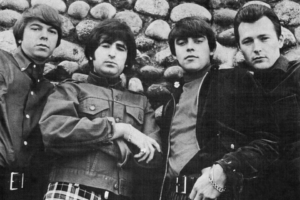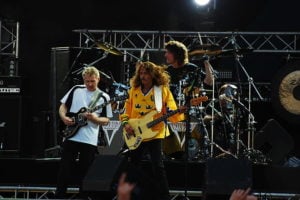
Photo: By Heinrich Klaffs [CC BY-SA 2.0 (http://creativecommons.org/licenses/by-sa/2.0)], via Wikimedia Commons
There were very important question about music copyright that came into play during this trail. The first question is based on the general fact over the use of chord structure and melodic line. In Western Music there are only twelve different notes. In most modern songs those twelve notes are dwindled down to the seven notes of a major or minor scale. So in essence the majority of popular songs written in the past one hundred years have all used the same seven notes. Now mathematically, seven notes do offer a vast opportunity for musical variation in the millions. However, is there really any one song out there that is a complete original in which no part of the song has ever been done before?
The part in question in “Stairway to Heaven,” used a descending bass line in a minor key that is a very common technique used in popular music. Listen to the chord structure at the end of “Stairway to Heaven,” and then listen to the chord structure of ELO’s “Evil Woman.” It is the exact same structure. Yet, Robert Plant and Jimmy Page have never sued Jeff Lynne of ELO has never over the use of playing the chords in the order of A minor to G major to F major. It would be simply ridiculous. Or how about every single do wop song ever written that used the same exact chord progression? Sure there are pieces that are complete ripoffs. Sam Smith’s entire chorus of “Stay With Me,” was a note for note copy of Tom Petty and Jeff Lynne’s “I Won’t Back Down.” Ironically, Sam Smith won a Grammy for Song of the Year for that one.
Did Led Zeppelin steal a part of Randy Wolf’s song “Tauraus,” from the Spirit album recording? Well , if you listen to the video below, you can make your own decision. Yes, there is a distinctive comparison between the two songs for about 20 seconds. But if you compare both songs in their entirety, there is no comparison. For those few seconds in which both songs sound similar, the next question asked would be did Jimmy Page subconsciously write a similar riff or was it simply coincidence? Well being that both bands performed together during the time period when both songs were released may answer that question. Regardless of a small section of the song, “Tauraus,” is no “Stairway to Heaven.”
But none of that mattered in the trial because of the way the songs were copywritten. The reason Led Zeppelin won the trial was because the songs were copywritten using form PA with the Library of Congress. The PA form enables the use of sheet music as the device in which the song is copy written. There is an option, to add a recording for the song to the copywritten, but in the early 1970’s most artists just used sheet music to copyright their songs. There is also the option for songwriters to file Form SR which copyrights the actual sound recording, but that form was not used by either party. When the jury was asked to hear the comparisons between the songs, both sides of the trial performed their songs acoustically reading from the sheet music that had been filed with the Library of Congress.
While the plaintiff performed the song on guitar, the defendant performed the part in question of “Stairway to Heaven,” on piano. According to those in the court house, there were hardly any similarities between the pieces. At least not enough to warrant the multi-million dollar lawsuit that had been brought against Robert Plant and Jimmy Page. Even though the performance did not show similarities, the jury did ask to hear sound recordings of both songs before their decision was made. But by then it was probably too late, because the live performances in the court room sealed the deal for Robert Plant and Jimmy Page to walk away without having to pay a dime to the estate of Randy Wolfe.


































You spelled copyright wrong in the article, it isn’t copywrite.
Copyright vs. copywrite – Grammarist
grammarist.com/usage/copyright-copywrite/
Copywrite is a rarely occurring backformation from copywriter—which refers to a writer of copy, especially in advertising. It has never caught on, and some might …
Thanks for your comment, however, it would have been nicer to have you actually finish the articles that you were supposed to write. Or at least responded to my request why you failed to finish your last two jobs.